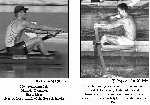The Pocock Generation, Part II
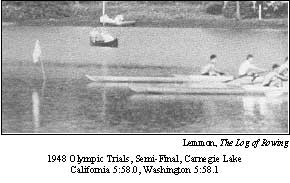
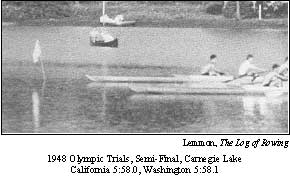 The Eight Trials
The Eight Trials
The IRA's had gone very well for the Huskies, the freshmen winning by two lengths, the jayvee by three lengths and the varsity by two lengths. After their IRA sweep, the elimination of the Washington varsity eight in the Trials by one-tenth of a second to California 1 was a crushing blow to Al Ulbrickson and to the crew.
Stan Pocock: "Washington pushed Cal down the course, never lagging by more than a few feet. With only twenty strokes to go, Washington's coxswain, Bobby Lee, had not called for a sprint even though they were still behind.
"When he looked over his shoulder and saw the finish line fast approaching, Charlie McCarthy tried to snatch victory from defeat in the last few meters of the race. He went into a finishing sprint on his own. The crew responded, but it was too late." 2
Rod Johnson, Washington 7-man: "About half-way through the race, I can remember thinking, 'They're just sitting there half a length ahead of us. Why aren't we catching them?'
"I used to yell a bit during races. I know you're not supposed to, but this is the thing that I have kicked myself around the block for half a century now. If I had just said one or two words, we would have gone past them in the next twenty strokes.
"But I didn't . . . and we just sat there.
"Finally, Bobby said, 'Okay, take it up.' We took it up, and on the seventh stroke we crossed the finish line. It should have been twenty strokes.
"Bobby Lee wasn't one to say much during the race. He was usually pretty quiet, and that's just the way he'd coxed all year, so I don't remember him saying anything until he told us to take it up.
"Before we knew it, the race was over and we had lost. I remember just sitting there waiting to wake up from a bad dream." 3
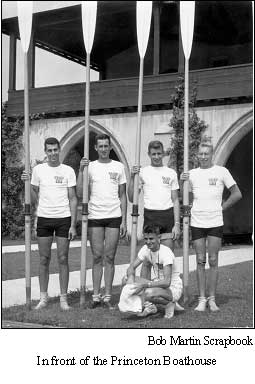 Giovanelli: "The varsity was a terrific crew. They were so much faster than California. Nobody could have touched them but themselves. Their cockiness surely got to them." 4
Giovanelli: "The varsity was a terrific crew. They were so much faster than California. Nobody could have touched them but themselves. Their cockiness surely got to them." 4
Morgan was at the finish line for the eights final. "It was so close. I have my opinion as to who won, but they gave it to California." 5
Martin was less charitable. "We were all standing on the shore when they lost. We were sorry for Al. We were sorry for the school, but we weren't sorry for those guys.
"They lost the Trials because they didn't row hard enough. Hell, they had beaten California twice already. There was no question they were a better crew. Everybody knew it.
"Al told us, 'If any one of you had been in that boat, they would have won that race!'
"After we made the Olympic Team we were all damn glad they weren't along. If they had made it, the Seattle papers would have completely ignored us and just covered them. If we won the Olympics, there might have been only an extra paragraph saying, ' . . . and the four won, too.'
"Another thing. When they lost their race at the Trials, that's the last we saw of any of them . . . except for Norm Buvick." 6
Rod Johnson: "We all went out to Fire Island with the MIT crew. Somebody had a cabin out there. It was a lost weekend." 7
After the eight had lost, the four also took off. Bob Martin: "At Princeton over the Fourth of July, we rented a car, went down to the Jersey Shore and went for a swim. Then we stopped at Lakehurst to take a look at where the Hindenburg had gone down.
"We laughed a lot! Those were the kinds of things you didn't tell Al about, not that you knew he'd object. The problem was you didn't know." 8
"Ulbrickson was really broken right after the eight race. He took it very hard and didn't want to talk to anybody.
"It was very painful for me, too.
"It still is . . .
"I've got friends that say, 'Hey, Rod, you've got to get over this. It's just racing.'
"Well, I can't get over it. Could you get over it if you knew down deep that you could have been in the Olympics, but you weren't?
"All that summer I couldn't stand to think about it. I was so bitter that we lost that for quite some time I couldn't really talk to the four. I was bitter, and that made me jealous.
"A long time later, I asked for their forgiveness for being such an ass, because that's what I was, and they deserved all the credit they got." 9
The Four Trials
Three days later in their opening heat, the Huskies recorded the fastest time of the eleven coxed-four entrants.
Two days later, "with fast conditions obtaining as a strong tailwind sped the shells on their way, the stern four from the University of Washington junior varsity eight that won at Poughkeepsie defeated Princeton in the concluding semi-final Olympic heat for fours with coxswain in the blistering time of 6:35.7. The best time listed for Olympic competition is 6:47.8 made by Italy in 1928 at Amsterdam.
"Earlier in the afternoon both Yale and Harvard had bettered Italy's time as the Elis came from behind and led the Cantabs home by two-thirds of a length in 6:41.1 to 6:42.8.
"Princeton's stern four from the varsity eight that had qualified for the finals last week also excelled Italy's time in finishing almost a full length to the rear of the Huskies in 6:38.5.
"Al Ulbrickson's four got the jump at a 43 beat, but for the first quarter mile there was little to choose between the crews.
"Both crews were around 32 through the body of the race. Then the power of the rangy Washington oarsmen told, and the big jayvee four drew away from the Princeton varsity quartet.
"Princeton came on madly in the last quarter-mile to cut down Washington's lead a bit, but the Huskies had it in their final twenty strokes and went away again to win by just short of a length." 10
Rod Johnson: "The four had a really tough row against Princeton in the Trials, and they said that if we hadn't lost our race they wouldn't have had the guts to hold on long enough to beat them, but being that we had lost, they figured they were that last chance for the school, and they just rowed their hearts out.
The guys all passed out after the race." 11
The finals were held the following day, July 10, 1948. "Washington's victory over Princeton in the semi-finals had stamped it as a strong favorite, and it led all the way today, though the race was close.
"The Huskies jumped Yale and the West Side Rowing Club by a deck at the start. At the end of a quarter mile they had three-quarters of a length lead on Yale, and by half mile a bit of open water showed.
"From there on it was a case of Yale closing some of the gap and Washington widening it in turn. The two leaders were rowing in the middle 30s.
"With less than half a mile to go, Washington was ahead by three-quarters of a length. It increased its margin to a length and two-thirds by 1,800 meters, and Yale hitting 40, cut it down a bit as they drove across the line." 12
1. Washington 6:43.3, 2. Yale 6:47.6, 3. Buffalo West Side 7:08.4.
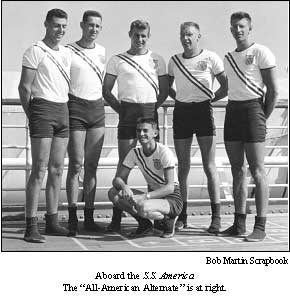 Clipper Two
Clipper Two
Martin: "The Clipper Too was especially suited to our needs. It had the same hull shape as a boat George had built specially for the Havana Rowing Club. He had designed it a little wider in the bow in order to handle the swells in Havana Harbor. The teardrop shape was perfect for us because our biggest man was Giovanelli in the bow seat." 13
Stan Pocock: "It was one of our 'roughwater' coxed-fours. It had a teardrop shape that could carry two very big men in the bow and still ride out onto the water when rowed properly." 14
Giovanelli: "We set a world record at the trials in Princeton that lasted until 1973 or 1974 and only was broken with more advanced equipment." 15
Bob Will: "When we got to England, and everybody was washing and polishing their shells, they would just not believe that our shell was twelve years old. Their boats were very light, very fragile and lasted maybe one season." 16 All-American Alternate
Martin: "Norm Buvick, the guy who had taken Gus's varsity 5-seat away from him when Al switched us all, Norm was the only guy to come back to see our final.
"We were allowed to select an alternate to be a part of the Olympic team, so we picked Norm." 17
"Buvick had been chosen for the 1948 All-American Team 18, so of course we called him our 'All-American Alternate.' He was great guy and took the ribbing well. We were glad to have him with us in England." 19
The 1948 Olympics
In 1936, Al Ulbrickson had told his wife, "If this crew can't win, then I'm through coaching!" 20 and now in 1948 his worst fear had actually happened. After his eight lost the Trials, Ulbrickson seemed to lose his zest.
When the four won its Trials, Al declined the position of Olympic small-boats coach. The coxed-four left for England officially under the supervision of Skip Waltz, the coach of the winning coxless-four from Yale.
Bob Will: "We couldn't believe Al wouldn't go to London with us. That really hit us pretty hard. Of course, we had no idea how it was all going to turn out." 21
"When we got to Henley, we had no coach for a couple of workouts, and they were a disaster. Skip was supposed to be in charge of us, but he didn't have the slightest inclination." 22
"He didn't much like us, and we didn't like him, so it was mutually satisfactory for George to step in and help us. 23
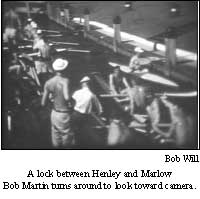 "When the Henley regatta site proved to be too crowded for launches, and when Ky Ebright failed in his attempts to coach his eight from the bike path, George Pocock suggested to him that the eight and four move to Marlow Rowing Club, about four miles downstream and through a couple of locks on the River Thames." 24
"When the Henley regatta site proved to be too crowded for launches, and when Ky Ebright failed in his attempts to coach his eight from the bike path, George Pocock suggested to him that the eight and four move to Marlow Rowing Club, about four miles downstream and through a couple of locks on the River Thames." 24
"It was on the way down to Marlow that George took over." 25
"In Marlow we became great friends with the California eight.
"When we began to train together, Ky asked us how much of a head start Al used to give us on the Washington eight. We told him 55 seconds when it was really only 30.
"Anyway, Ky's crew couldn't come close to us, and that really worried him . . . until we told him of our trick.
"While we were in Marlow, we short-sheeted Ky's bed, apparently the only time in his life that ever happened to him.
"Rowing back to Henley after our week away, we had to go back through the locks. The eight and four squeezed into the first lock side by side, and the coaches' launch waited for the next opening.
"As soon as the lock closed, we pulled the boats together and exchanged seats with the stern four of the eight.
"We had already taught them the Washington Fight Song, so when the locks reopened and the launch caught up, Ky was greeted with his crew singing like a real Husky crew.
"He was fit to be tied, and we all had a great laugh." 26
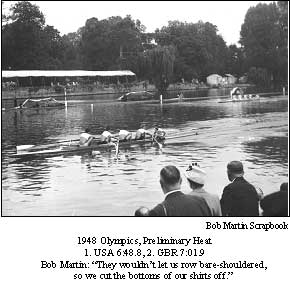 The Preliminaries
The Preliminaries
Associated Press: "In a blue haze that never really lifted, the four-day Olympic Regatta opened with a triumph by the University of Washington four-with-coxswain. Their performance in beating Great Britain was a standout, too.
"The quartet coasted home three lengths in the clear in 6:48.8, the best time of sixteen entries for that event." 27
In the morning two days later, the U.S. four won their quarter-final round by five lengths over Finland, 7:21.4 versus 7:36.5. Switzerland and Denmark also rowed 7:21s to win their quarter-finals.
George Pocock later wrote about their experience in that afternoon's semi-final: "My racing plan has always been, whether rowing my single or advising a crew, 'Know your capabilities, and row your own race.' Row each 500 about the same, but be sure you are rowed out at the finish.
"In the two preliminary races, they had started at a lower stroke and only gained the lead in the last 500 meters. In the semi-final race with the French four, the crew asked if they could go off with the lead.
"I said, 'Yes, but I hope you won't be sorry.'
"So they started off with a very high stroke but were unable to get out in front. They were obviously well off the pace, but finally settled down to their usual beat, began to gain steadily, and ended up the winner [by 6.8 seconds].
"I knew by the times that both Denmark and Switzerland were better than France, and they were the two crews we had to meet in the final race for the Gold." 28
Bob Will: "In the Olympics, we'd watch Switzerland. We figured they were the ones to beat because they had times that were about even with ours, and their cadence was about the same as ours. They weren't flailing along like some of the others were, and sure enough they were our toughest competition in the finals." 29
A Final Adjustment
George Pocock: "The day after the semi-finals was a Sunday, and there was no racing. I wanted to make good use of that time. In the excitement of two days of highly competitive racing, they had lost the essential art of keeping a strong, clean run on the boat between strokes. We went out above the bridge where I could coach from a launch and went to work.
"A good run is attained by hanging on to or 'squeezing' the finish, at the same time returning to at least an upright position, so that the weight is out of the bow via the squeeze of the blade in the water." 30
This was George Pocock describing in his own words his preferred ferryman's finish, the second feature of the Pocock Stroke not emphasized sufficiently, in his opinion, as part of Al Ulbrickson's 2nd Generation Conibear Stroke. He had begun making this technical adjustment to the four back in Marlow.
Gus Giovanelli recalls: "After we began practicing, he took the boat and reduced the pitch on the riggers. This made it more difficult for us to get out at the finish and forced us to drive all the way to the release." 31
Returning to that Sunday practice, Pocock also wrote: "A coach has to be a dictator at times, and I said, 'We are not going in until we get that run between strokes,' and just as dusk was setting in, they made a beautiful run, the boat fairly ghosting along between strokes.
"'That's it! That's it for tomorrow. Let's go in!" 32
Giovanelli: "That last day, George still thought Wes wasn't getting his blade far enough into the water, so the night before the final, he went down to the boat tent and changed his oarlock without telling him.
"After the race, Warren said he had never been so tired in his life." 33
- see pp. 301-3
- S. Pocock, p. 43
- Johnson, personal conversation, 2005
- Giovanelli, personal conversation, 2005
- Morgan, personal conversation, 2005
- Martin, personal conversation, 2005
- Johnson, personal conversation, 2005
- Martin, personal conversation, 2005
- Johnson, personal conversation, 2005
- Allison Danzig, The New York Times, July 10, 1948
- Johnson, personal conversation, 2005
- The New York Times, July 11, 1948
- Martin, personal conversation, 2005
- S. Pocock, p. 297
- Giovanelli, personal conversation, 2005
- Will, personal conversation, 2005
- Martin, personal conversation, 2005
- Back in those days, at the behest of Royal Brougham of the Seattle Post-Intelligencer, the country's rowing coaches got together each year "to vote on a mythical, All-American Crew, composed of the best oarsmen among all varsity crews. Each coach had one vote, along with Brougham and Allison Danzig of The New York Times." - Chuck von Wrangell
- Martin, personal conversation, 2005
- qtd. by Scott
- Will, personal conversation, 2005
- Martin, personal conversation, 2005
- Will, personal conversation, 2005
- Giovanelli, personal conversation, 2005
- Martin, personal conversation, 2005
- Giovanelli, personal conversation, 2005
- Associated Press, August 5, 1948
- G. Pocock, qtd. by Newell, p. 116
- Will, personal conversation, 2005
- G. Pocock, qtd. by Newell, p. 116
- Giovanelli, personal conversation, 2005
- G. Pocock, qtd. by Newell, p. 116
- Giovanelli, personal conversation, 2005
If you enjoy and rely on row2k, we need your help to be able to keep doing all this. Though row2k sometimes looks like a big, outside-funded operation, it mainly runs on enthusiasm and grit. Help us keep it coming, thank you! Learn more.
- Bont Rowing
- Calm Waters Rowing
- Concept 2
- Craftsbury Sculling
- The Crew Classic
- CrewLAB
- Croker
- Durham Boat Co.
- Empacher
- Faster Masters
- Filippi
- Fluidesign
- h2row.net
- HUDSON
- Live2Row Studios
- Nielsen-Kellerman
- Oak Ridge RA
- Peinert Boat Works
- Pocock Racing Shells
- Race1 USA
- RowKraft
- Rubini Jewelers
- Vespoli USA
- WinTech Racing
- Bont Rowing
- Calm Waters Rowing
- Concept 2
- Craftsbury Sculling
- The Crew Classic
- CrewLAB
- Croker
- Durham Boat Co.
- Empacher
- Faster Masters
- Filippi
- Fluidesign
- h2row.net
- HUDSON
- Live2Row Studios
- Nielsen-Kellerman
- Oak Ridge RA
- Peinert Boat Works
- Pocock Racing Shells
- Race1 USA
- RowKraft
- Rubini Jewelers
- Vespoli USA
- WinTech Racing





